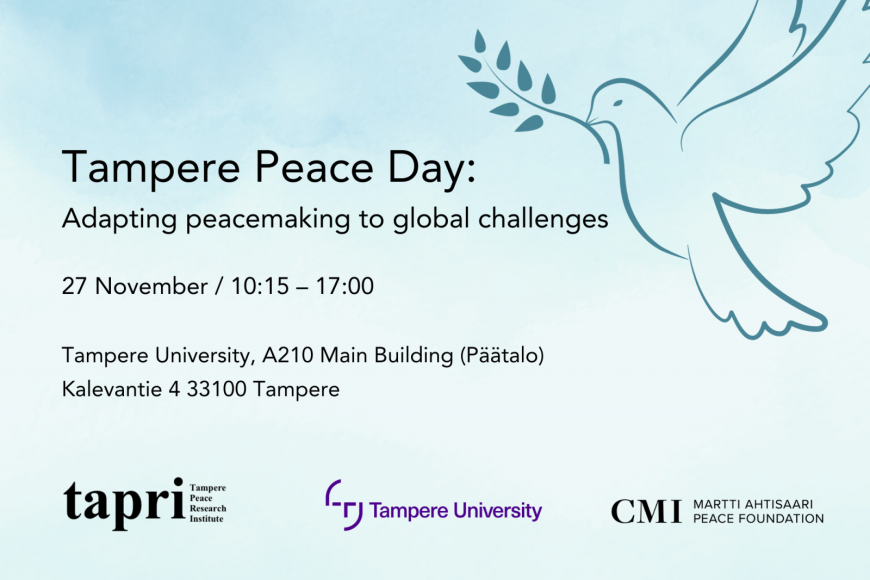New event brings together peacebuilding professionals and peace researchers

The first Tampere Peace Day will bring together people working on peacebuilding, international conflicts and security to discuss how to adapt to current global challenges and work for a peaceful tomorrow. Thus far, Finland has lacked a forum for bringing together researchers and peacebuilding professionals to exchange their knowledge.
The Tampere Peace Day congress is organised by the Tampere Peace Research Institute TAPRI together with CMI – Martti Ahtisaari Peace Foundation.
TAPRI’s Research Director Marko Lehti says that academic research has been mainly left out from existing forums that have brought peacemakers together. Contacts between academic peace research and peacebuilding professionals have remained sporadic. On Lehti’s initiative, TAPRI started to plan a new concept with CMI. Since both organisations are international, the congress is as well, which is reflected in the selection of the international speakers and panellists invited to the event.
“CMI and the peace researchers’ community produce information in different ways, the former in peacebuilding operations and the latter by the means of research. Although our starting points are different, we are still dealing with the same questions,” Lehti says.
“The basic ethos of peace research is the aim to influence the world and support its peaceful development. This is needed in difficult times. We are working together to ensure that peacebuilding and mediation still have a place in the world,” he adds.
The aim of the Tampere Peace Day is to create a forum for a sense of community and discussion. The programme includes armchair panels, keynote presentations, and group discussions.
Uniform basis eroded in peacebuilding: the field needs new thinking
Lehti thinks that peacebuilding and the multilateral world more broadly are undergoing a drastic transformation. At the same time, the room for peacebuilding has narrowed, and neither the UN’s peacebuilding nor EU’s crisis management have access to many of the world’s conflicts.
“Since Russia started its war of aggression, the international community has lacked suitable operating models to resolve inter-state conflicts, which were already believed to have disappeared from the world. At the same time, the utilisation of collective violence for political ends is seen as increasingly acceptable world-wide,” Lehti points out.
He says that, for the past three decades, peace has been built from Western starting points. Researchers and peacebuilders have emphasised that peace cannot just be imported. Instead, the basis of working for peace is to support local communities in their peaceful coexistence and dialogue. Lehti mentions that it is clear that globally there is no longer a single normative basis for justifying peacebuilding and defining peace, and emphasises that, to be working, peace mediation should avoid normative interventionism and aim to adapt to the changing and complex world.
Lehti says that, in addition to the decolonial critique form Global South, Western peacebuilding ideals have been severely challenged by such authoritarian states as China and Russia. They come with their own understanding of peace by understanding it as state security and control.
“The increased focus on state sovereignty further narrows the space and opportunities for peacebuilding. At the same time, the inability of multilateral institutions to prevent and mediate conflicts between states and, more generally, the use of force by states is more pronounced.
“We need new ways of thinking about how to act in the new situation and in the still unknown but changing world of the future. The ways in which we have learned to think about peace over the past 25 years no longer apply,” Lehti points out.

Tampere Peace Day is organised for the first time
Founded by the President of Finland and Nobel Peace Laureate Martti Ahtisaari (1937–2023) and continuing his work, CMI – Martti Ahtisaari Foundation is one of the world’s leading private mediation organisations operating around the world while TAPRI is one of the leading centres for peace and conflict research in Europe.
According to Lehti, the way in which Ahtisaari, who represented a non-state actor (NSA) at the time, became nominated as a chief mediator for the Aceh peace process was unique. Lehti continues that the outcome of the negotiated peace has endured reasonably well.
“Ahtisaari thought that all conflicts can be solved because they are caused by people. His role as a mediator was very significant also after his presidency. Inspired by him, mediation was included in the main agenda of Finnish foreign policy,” Lehti sums up.
The Tampere Peace Day conference is funded by the Research Council of Finland’s PROFI7 project Sustainable Security Practices (SUPRA). The conference is the kick-off event of the SUPRA project. As a research community, SUPRA is one of the University’s main research profiling areas in the period of 2023–2028. SUPRA consists of a project led by Professor Pami Aalto at the Faculty of Management and Business and TAPRI’s project led by Marko Lehti. TAPRI’s share in the profiling area focuses on the multilateral world and practices of peace.
Tampere Peace Day event is arranged at 10.15-17.00 on Monday 27 November 2023. The venue is the main auditorium A210 in the Päätalo building on the city centre campus of Tampere University. You may sign up for the event by filling in the registration form on TAPRI’s website by 19 November 2023.
Further information:
Research Director Marko Lehti, marko.lehti [at] tuni.fi





